What better panacea for the maladies of urbanisation than spending the day making bricks, sawing wood and working the land? The Ground-Up Initiative (GUI) seeks to provide exactly that, one day at a time. Every weekend, bright-eyed volunteers from all walks of life–housewives, NSmen, students and directors among them–would gather at the modest premises that serves as the intitative’s headquarters to balik kampung–‘return to the village’ in Malay. Excited and heartened to learn of a community of nature-lovers in this dense urban jungle, I paid them a visit one Saturday morning to see what they were all about.
Going down Lorong Chencharu and stepping into the makeshift kampung felt, for me, almost like stepping into a different realm. In line with the organisation’s goal of being in step with the earth, the premises of their headquarters seemed to be intricately woven in with elements of Nature herself. The roof was crafted of woven straw, which also framed the clusters of lights that hung from the ceiling. The front of the building looked out over a thin stream, flanked by steep grassy banks, and sat adjacent a swathe of forest. Man-made materials such as disused glass bottles and old bicycle wheels had also been artfully incorporated into other parts of the building, adding to its rustic feel rather than detracting from it. Already at eight ‘o clock on a weekend morning the main team of long-term volunteers were getting down to business, discussing the schedule for the day with a lively energy and infectious congeniality.
Shortly after, other volunteers streamed in. The gotong royong (community spirit) that being in touch with the earth fosters soon set in as everyone got down to work after being assigned jobs for the day. Every person there pitched in, whether they were four or forty years old, and individuals who had been total strangers just a few minutes before began to swap friendly banter and ask on each other’s well-being. Such camaraderie was rare in the modernised, urbanised community I had grown up in, and it was then that I understood why some of the older generation here would muse about the kampung days gone by. For two hours everyone had been bonded by the menial work and immersed in a happy atmosphere of enthusiasm, whether they were washing toilets or preparing lunch.
After work for the day was done, everyone sat down in the ‘living room’ to a video on the origins of the Ground-Up Initiative, presented by none other but the founder Tay Lai Hock himself. Here I have endeavoured to render his narrative, coloured with anecdotes and steeled with a solid conviction, of the story behind the kampung as best as I remember it.
Tay Lai Hock
“I always love village life. I went backpacking for four years and for two months I stayed in a village in Thailand. There was very little lighting, lighting was very dim, and if you want hot water you have to go down to the stream and get the water yourself. People would say, ‘Wow Lai Hock you must really like village life,’ but I’d never lived in a village before then! The closest was that the street name was Kampong Aran. Then I met an Irish lady while hitchiking, who would go back to Ireland every six months to take care of her mother. She said, ‘I’m going to WWOOF in Spain!’ and at first I thought it was ‘woof’ as in the sound the dog makes, and she explained it was World Wide Oppurtunities on Organic Farms. Then I met another woman who said, ‘I’m going to WWOOF in Ecuador!’ So I helped out at an organic farm in Ecuador. There was no heater. The toilet we used was a composting toilet! We had to work with horse shit everyday. At first I thought it would only be old people on the farm, but there were actually two young men helping out. In Ecuador I held a photo exhibition to help the poor, and I went out on the streets, asking people to come see my photos. Some of them would ask me, ‘Are you Ecuadorian?’ and I told them, ‘No I’m a Singaporean’ and they replied, ‘Then why are you helping us?’ I told them, ‘I can’t just be a bystander, can I?’ We even decided to create a website–Internet speed was only 56 kb/s at the time–and mobilised people to help!
I went backpacking in New Zealand and stayed with a friend. She’s Malaysian; married a Kiwi. You see their children were playing, so carefree! Not like Singaporean kids; they’re so annoying–not all, of course! There I attended a lecture by a local professor on the bank of a river. There was no public transport so people had different ways of getting there. One guy came all the way down the river in a canoe! The professor told us, ‘You can lie down,’ so there were people just lying down on picnic mats listening to his lecture! We ate fresh fruit. Crushed our own apple juice–I never drank so much apple juice in my life. There was a guy who powered a washing machine using his bicycle. Can exercise and wash his clothes at the same time. A house built in a truck–would you like to live in one? I helped to build that house. And they made their own pizza and served it on cardboard. Wow, cardboard, who knew?
But then I went hitchiking again and they say, ‘When you go hitchiking in New Zealand 90 percent you will see Maori.’ One day a Maori driver in a cab pulled up next to me. I told him ‘I want to go this way.’ He said, ‘I’m going the other way, but I can take you to someone who’s going that way.’ We went to his house and he asked, ‘Have you eaten breakfast?’ I said ‘No’ and he replied ‘Well we have fish head freshly-caught this morning, would you like it smoked?’ And I love fish head; I’m a Singaporean! And what struck me was how they were willing to share what they have with others.
I met a professor who was very unhappy. Had a war with his neighbour for 20 years. You would think he’d be very healthy but he died of a brain tumour. His last words before he died were, ‘I should have focused on the right thing.’ That thing was happiness.
Then I realised that a lot of society’s vices are caused because there is no farming. Singapore is unhappy, because we are so heavily urbanised. Maybe that’s why the country is so rich, because we are so unhappy. I decided to return to Singapore while sitting in the Sahara Desert in 2002. When I came back I decided to reach out to the students by talks in the polytechnics. When I was at ITE I saw the students were very sleepy so I told them, ‘You can lie down’ and they were shocked. But after lying down for ten minutes all of them were sitting up. Later when I was volunteering in Malaysia I gathered a group of volunteers and I decided to call this the Ground-Up Initiative.
I started this project back in 2008. People would ask me, ‘Lai Hock, are you an architect? Do you have enough funds?’ But I have guts, and I have heart. In 2001 I approached the owners of Bottle Tree Park wanting to rent the land. The owner told me one sentence in Chinese ‘先做给我看.’ Let me see it first. We rented the land for two years, and there were more people coming to give their support. Now we managed to lease the land for another 6 years.
There’s also a spiritual dimension to farming. We’re an open, multi-faith community. We want to nurture leaders by teaching them through farming. To have a sustainable community, you need to farm your heart first. Some days I feel like giving up, but it’s the people that keep me going.”
At noon, the communal plant-based lunch was ready. Ending the day by tucking into mixed rice and vegetable soup with new friends didn’t just hail the camaraderie we had forged over the span of a few hours. It was also a tribute to the inter-connectedness of man and the natural world.
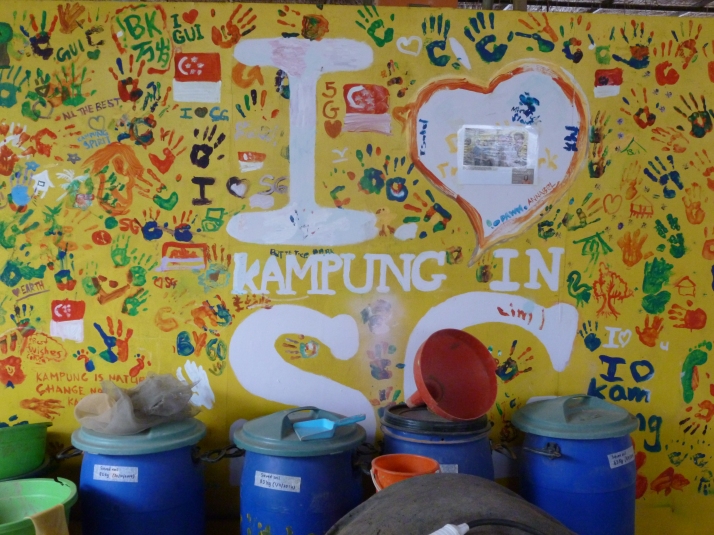
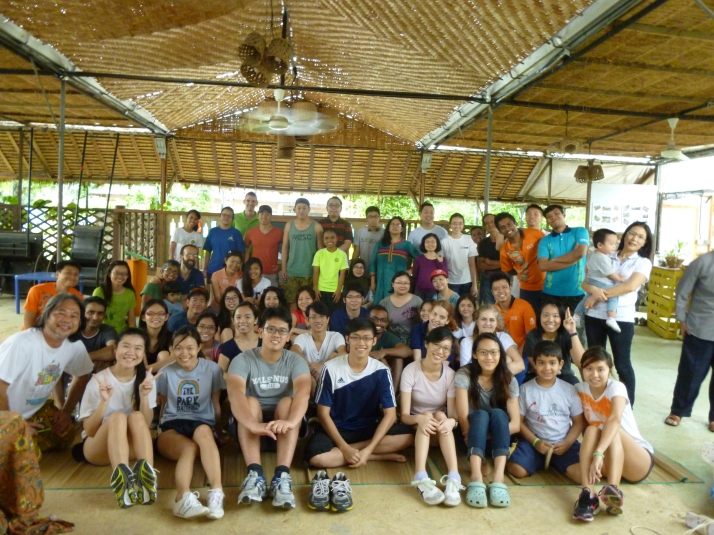
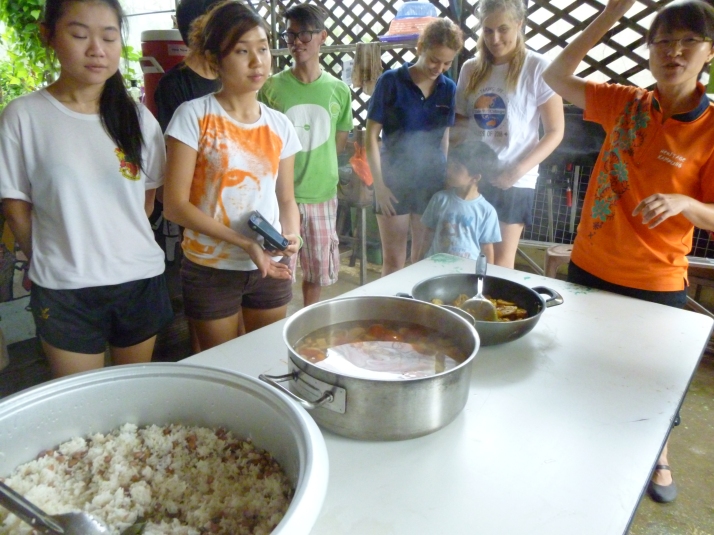
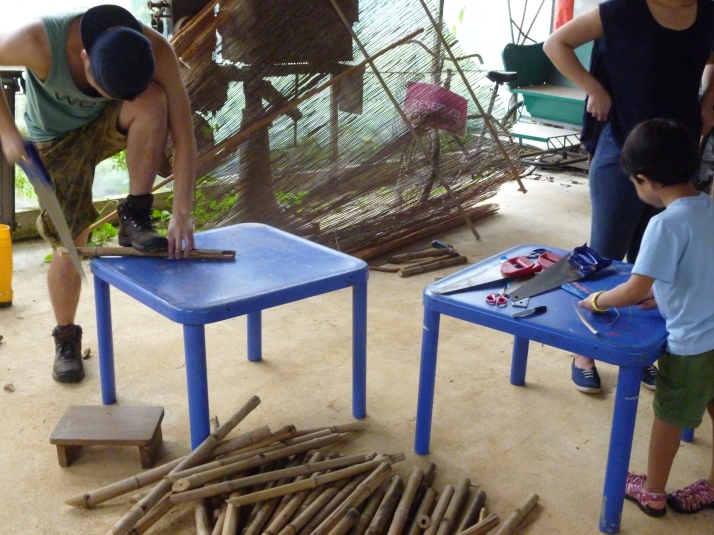
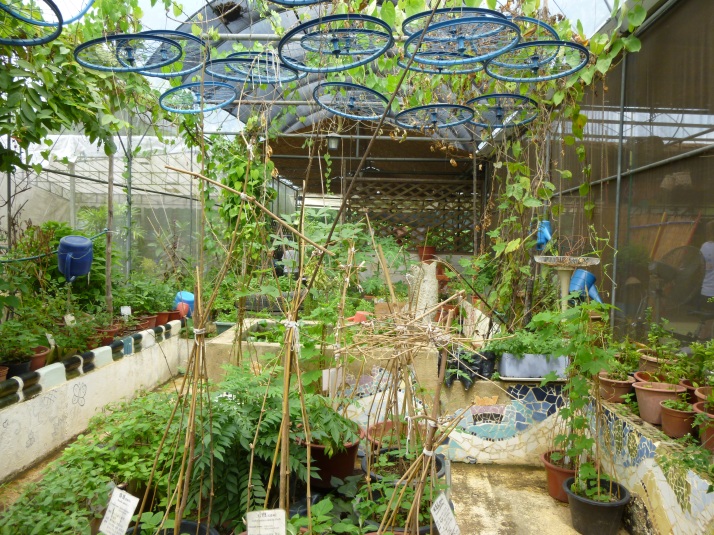
Thank you so much for coming! It was a joy seeing you around. Hope you will visit and join us again.
LikeLike
Hi Farez! I should be thanking you guys for having me over and being such an amazing bunch of people 🙂 I didn’t get to do much the first time, unfortunately, so hopefully I can return another time.
LikeLike
I just volunteered there the other day with The Hidden Good. It’s a fantastic place. Thanks for your blog post- I’ve been trying to learn more about them but haven’t really had the time, and this was a great stumble.
LikeLike
Hi Jared! I’m glad to have been of help 🙂 I’ve also been hoping to help out with or at least learn more about The Hidden Good too, actually.
LikeLike
I was there last year when I was in Singapore and loved every moment of it, your blog post brought back those beautiful memories and an adventurous and a fascinating story which I didn’t know about . Would love to come to Singapore again just to relive the Balik Kampung life.:)
LikeLike